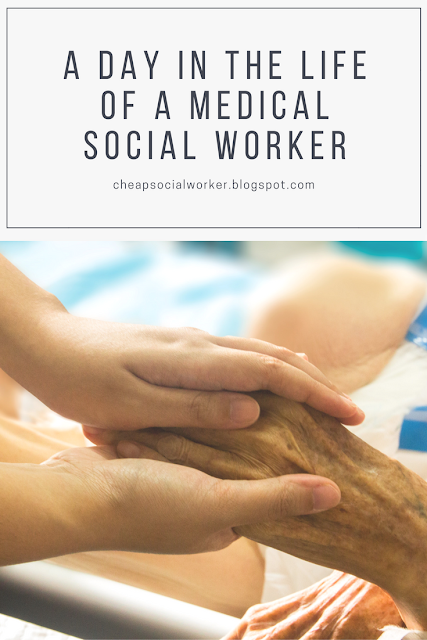A Typical Day in the Life of a (not so) Cheap Medical Social Worker
6:20am: Alarm clock goes off. I hit the snooze button.
6:30am: I drag myself out of bed, wash up, throw some clothes on, and slap my makeup on my face.
7:00am: I run out the door and proceed to sit in traffic for the next hour.
8:00am: I arrive at work, clock in, and head to my desk to print out the hospital census. After figuring out who all the new patients are, I go through each one to determine if they need to be "triggered" for a discharge planning and/or social services assessment.
Most common discharge planning triggers include:
- High fall risk
- Chronic illnesses prone to hospital readmission (i.e. congestive heart failure)
- Patients discharged and readmitted within the past 30 days
- Difficulties with activities of daily living (i.e. bathing and toileting)
- Patients likely to have medical discharge planning needs such as skilled nursing placement, durable medical equipment, and/or home health
- Financial issues (i.e. uninsured, homeless)
- Mental health problems (i.e. depression, anxiety, 5150)
- Substance abuse
- End of life concerns (i.e. hospice, comfort care, advance healthcare directive education)
- Lack of family support
- Abuse (child or elder)
- Domestic violence
- Discharge planning assessments
- Social services assessments
- Social services follow-up visits (i.e. support needs, community resources/referrals
- Patients being discharged and needing skilled nursing placement, home health, or durable medical equipment
- Patients needing a copy of the Important Message from Medicare Letter reissued (must be done within 48 hours of discharge)
9:00am: I start working on my to-do list by prioritizing cases in the following order:
- Any crisis situation that may arise during the day (i.e. code situation, sudden death, etc.)
- Patients needing immediate placement (specifically those under involuntary psychiatric hold)
- Patients with acute safety concerns (i.e. abuse, domestic violence)
- Patients with discharge orders who have immediate needs (i.e. skilled nursing transfer, home health care, hospice, durable medical equipment, transportation assistance, homeless shelter placement, follow-up doctor's appointments for high risk patients)
- Reissuing Important Message from Medicare Letters to patients with discharge orders
- Social services assessments of new patients
- Discharge planning assessments of new patients
- Reissuing Important Message from Medicare Letters to patients who may discharge in the next 48 hours
1:30pm: Lunch (if I have time)! By this time of day, I should have everything set up for my patients with discharge orders. This includes transportation for patients transferring to other facilities, home health orders faxed to the appropriate agencies, and durable medical equipment issued to patients needing it.
2:00pm: I come back from lunch and start working on the rest of my to-do list.
3:30pm: Around this time of day I start getting physician orders for the next day's discharges. Typically this involves arranging nursing home placement, home health care, or hospice. My role is to inform patients of the discharge plan, see if they have a preference for a facility/agency, and make arrangements.
4:00pm: If I'm having a particularly bad day, I'll get last-minute orders to transfer a patient to another facility or arrange post-hospital care. Otherwise, around this time I start typing up a "handoff" for the next day's social worker, which includes a summary of what I did for each patient and a list of what still needs to be done.
4:30pm: Barring a crisis or super last-minute orders, I can clock out and go home!
5:30pm-8pm: Arrive home, eat dinner, clean up, watch baseball, play video games, blog, etc. To be honest, I don't do much on weekdays because I'm too drained after work.
10:30pm: Bedtime! Usually I end up going to bed much later because I lose track of time. I know, it's something I need to work on!
Hope this gives everyone a better idea of what I do at work. Please feel to ask questions in the comments section.




